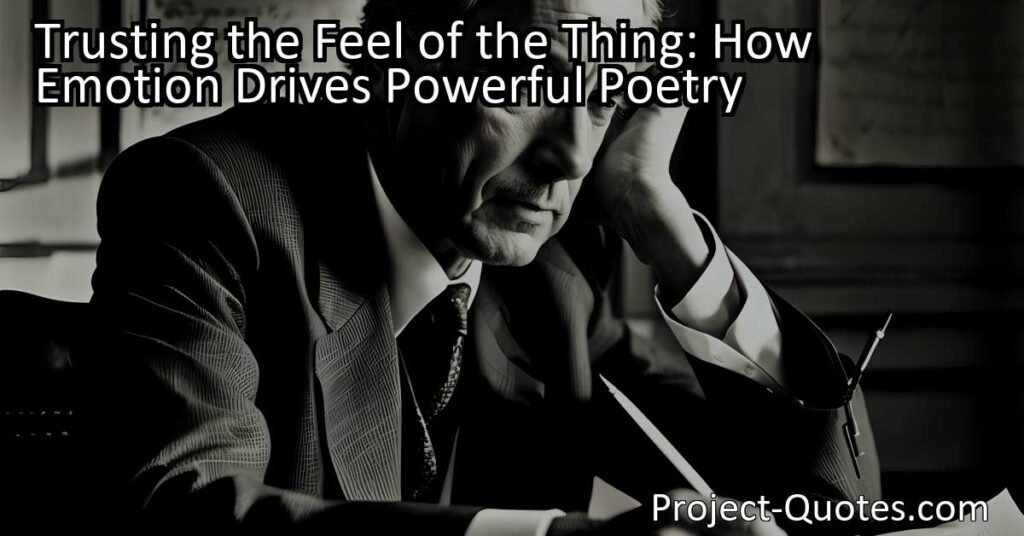What has any poet to trust more than the feel of the thing? Theory concerns him only until he picks up his pen, and it begins to concern him again as soon as he lays it down.
John Ciardi
Trusting the Feel of the Thing: How Emotion Drives Powerful Poetry The power of poetry lies in its ability to move us without needing complex analysis. By trusting in the emotive essence of their work, poets create a deep connection with readers, evoking powerful emotions that transcend rational thought. When poets embrace vulnerability and let their emotions guide their pen, they create literary magic that resonates on a profound level.
Table of Contents
- 1 What has any poet to trust more than the feel of the thing? Theory concerns him only until he picks up his pen, and it begins to concern him again as soon as he lays it down.
- 2 John Ciardi
- 3 Meaning of Quote – What has any poet to trust more than the feel of the thing? Theory concerns him only until he picks up his pen, and it begins to concern him again as soon as he lays it down.
- 4 Freely Shareable Quote Image
- 5 Related
Meaning of Quote – What has any poet to trust more than the feel of the thing? Theory concerns him only until he picks up his pen, and it begins to concern him again as soon as he lays it down.
When it comes to poetry, there is an undeniable allure that lies in the essence of the words. As poet John Ciardi once said, “What has any poet to trust more than the feel of the thing?” This quote encapsulates the idea that a poet’s trust in their work lies in its emotional power, the visceral reactions it elicits. Theoretical aspects of poetry may occupy their minds momentarily, but ultimately, it is the ability to convey emotion that captivates both the poet and the reader.
Poetry, at its core, is an art form that relies heavily on the senses. It has the power to transport us to distant lands, evoke intense emotions, and paint vivid pictures through its carefully chosen words. However, this can only be achieved when the poet is attuned to the “feel of the thing,” the emotional resonance that originates from within.
A poet’s trust in their work is like a delicate dance between theory and emotion. Before they even pick up their pen, they may find inspiration in various theoretical aspects of poetry such as meter, rhyme, or structural form. These elements act as tools that help them give shape to their emotions, shaping them into something tangible. However, once the pen is in hand, the theory takes a backseat as the poet delves into the raw, unfiltered essence of their emotions.
The act of writing itself becomes a transformative experience, a way for the poet to make sense of their own emotions, thoughts, and experiences. As Ciardi implies, it is during this moment that theory recedes into the background, and the true essence of the poem takes center stage. Each word becomes a vessel, carrying with it the weight of the poet’s emotions and the depth of their experiences.
But what is it about the mere “feel of the thing” that allows a poet to trust it more than anything else? The answer lies in the inherent power of emotions. Emotions are universal; they transcend the boundaries of language, culture, and time. When a poem is crafted from a place of authentic emotion, it becomes a bridge that connects the poet to the reader, allowing them to share in the same feelings and experiences.
Moreover, trusting in the feel of the thing means embracing vulnerability. It means being unafraid to lay bare one’s emotions and expose their innermost thoughts to the world. When a poet lets go of the theoretical constraints and allows their emotions to guide their pen, they enter a realm of profound honesty. It is from this place of vulnerability that true connection with the reader can be established.
Furthermore, the feel of the thing is not limited to the emotions it evokes. It encompasses the rhythm, the cadence, and the auditory beauty within the poet’s words. It is the way the poem resounds in the mind of the reader, leaving an indelible mark. Just as a piece of music can move us without requiring intellectual analysis, a poem can do the same. The feel of the thing envelops the reader, taking them on an emotional journey that transcends rational thought.
Nonetheless, the role of theory in poetry should not be entirely dismissed. It provides the necessary framework, the scaffolding upon which the poet can build their emotional landscape. It is the foundation that allows them to channel their emotions effectively, to craft a poem that will resonate with both their own soul and that of the reader.
Theory also offers poets the opportunity to experiment, to push the boundaries of conventional forms and challenge traditional ideas. By understanding the theoretical underpinnings of poetry, they can wield it as a tool for innovation. The interplay between theory and the feel of the thing is a delicate balance, an intricate dance that allows poets to create works that are both emotionally resonant and artistically groundbreaking.
In conclusion, John Ciardi’s quote highlights the central role that emotion plays in poetry. The feel of the thing, the raw, unfiltered essence of emotions, is what ultimately allows poets to trust in their work. Theory may provide the necessary structure, but it is the emotive power of a poem that establishes the connection between the poet and the reader. So, poets, as you pick up your pen, let the emotional energy flow, for it is through the feel of the thing that true literary magic is born.
I hope this quote inspired image brings you hope and peace. Share it with someone who needs it today!


